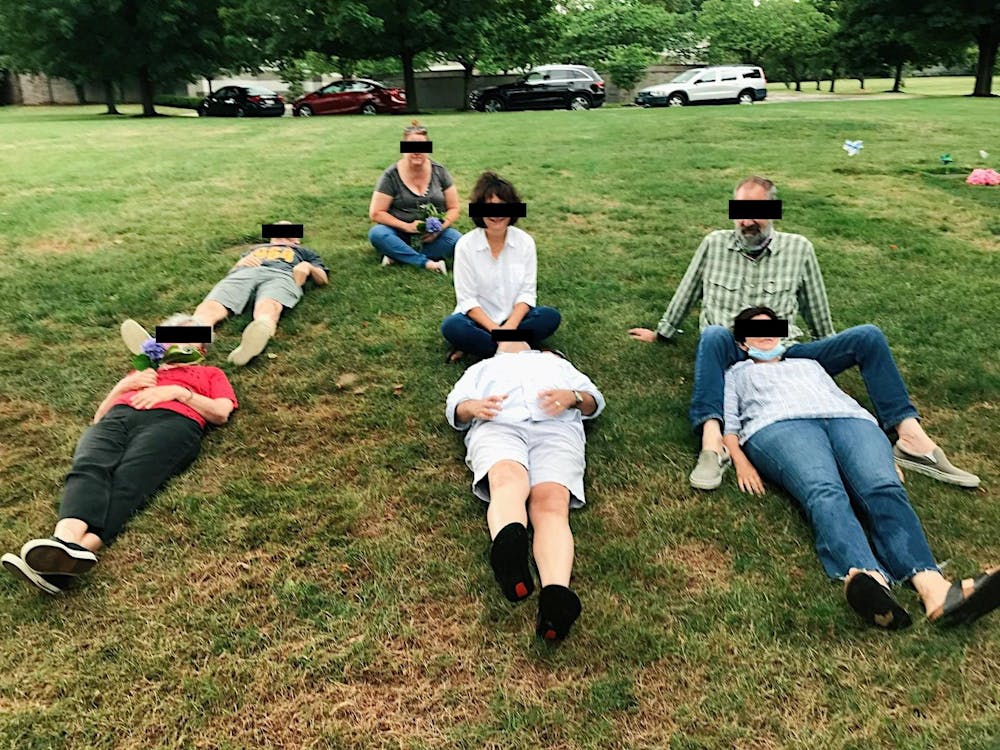When my dad told me he had a “funny cemetery story,” I expected it to be about a childhood prank or a Halloween night gone wrong.
Instead, he told me a story about his old friend, John. John has had the unfortunate luck of losing both his father and one of his sisters within the past five years. In the way that shared grief will motivate you to cherish the ones you love, his extended family recently got together for a reunion and visited the cemetery where John’s father and sister are buried.
I imagine it is a warm day in Ohio when they arrive at the cemetery, entering through a little gate and joining the other visitors milling around its grounds. Gathered together, the family walks to the correct area and gazes down at the two plots occupied by their loved ones. As people do, they probably share some heartfelt stories and reflect on their favorite memories of the two. John’s mother, struggling with her own health complications, has already bought the plot of ground next to his father. John owns the plot next to his sister.
Then, someone throws out an idea:
“While we’re all here, why don’t we pick out our own plots?”
The idea sinks in for a second. Then, what seems like a facetious (but weirdly practical) suggestion results in the featured picture: each family member posing for the camera, perched upon the plot of grass they would like to claim for the afterlife.
Now, you might be thinking, what the hell? Why did I have to read this weirdly morbid story? “Funny” and “cemetery” should not be in the same sentence, for God’s sake, and it wasn’t even that funny of a story. Have some respect for the deceased.
And to you my disgruntled reader, I say: aha! You may be among one third of Americans who are uncomfortable just thinking about their own death. Yet, strangely, 90% of the country is fine talking about the idea of death and dying.
It appears that our attitudes toward death suddenly change when the subject at hand is oneself. We see this struggle play out in literature, movies and societal spending. Ivan Ilyich agonizes over the “black sack.” Another billionaire tries to live forever. The stories change, but the struggle is the same: we think of ourselves as the exception to the inevitable, ignoring every sign to the contrary as we hurdle toward our fate.
Our naive obsession with immortality is not unreasonable, seeing as it is almost impossible to wrap one’s head around the idea of ceasing to exist. We have no memories before our birth, no memory of what it “feels” like to not have a physical presence, no concept of “nothingness.” Not only that, but everything we perceive is in relation to ourselves — your every experience hinges on the common denominator of you. The TV is in front of you, your friends are talking, your teacher gets sick. So, when we die, it is not just our bodies that will be gone. It feels as though everything we know about the world will also cease to exist.
Even if we could fully comprehend death, I presume that it would still not stop us from fearing it. It is easy to imagine getting to the end of the road and feeling like there was still more to do — more places to visit, more people to meet, more books to read. The idea that your own book of life could end at any chapter, finished or not, is terrifying.
Yet, that is exactly why we should face our mortality head on. We may not understand it or you may believe there will always be too much to accomplish before your time is up. But avoiding death will not make you live forever; instead, it will only tempt you into taking this precious time for granted.
People with near-death experiences (NDE) often report a newfound appreciation for life. Exposed to the fragility of their existence, NDEs jolt them awake to the realization that every day is a gift, not a given. They move through life with a sense of gratitude and intentionality, taking the time to think about their purpose and spending more time loving others.
While the planner in me does not buy into the “live like you are going to die tomorrow” doctrine, one would hope it does not take an NDE to instill a healthy sense of urgency into your life. If you simply accept the fact that your time here is limited, you might start to notice a shift in your priorities. It will force you to be intentional about how you’ll spend your days, how often you pick up the phone to call your mom, how long you spend stressing about that five-point assignment.
Our lives have value precisely because they come to an end. So go ahead, pick your plot. Think about who you want next to you at the end of the road. Think deeply about what you would want said on your gravestone or in your eulogy. If you have the bravery to accept responsibility for this transient existence of yours, it may free you to live more fully.
Allison Elshoff is a senior business analytics major with minors in the Hesburgh Program of Public Service and impact consulting. Her top three things to exist are hammocks, outfit repeating and mini spoons. You can reach her at aelshoff@nd.edu.










